高中英语语法(全英详解无水印)
(完整word)高中英语语法归纳总结,推荐文档
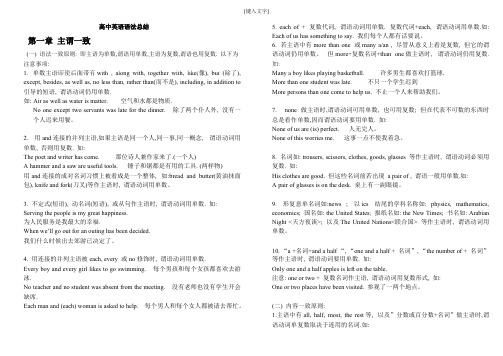
(一) 语法一致原则: 即主语为单数,谓语用单数,主语为复数,谓语也用复数. 以下为
语动词仍用单数。 但 more+复数名词+than one 做主语时, 谓语动词仍用复数.
注意事项:建议收藏下载本文,以便随时如: 学习!
1. 单数主语即使后面带有 with , along with, together with, like(像), but (除了),
作用 种类
不定式
主语 √
宾语 宾语补足语 表语
√
√
√
定语 √
状语 √
6. the +形容词/过去分词形式”表示一类人或事物, 作主语时, 谓语动词用复数. 如: The injured were saved after the fire.
动名词
√
√
×
√
√
×
分词
×
×
√
√
√
√
非谓
引导的短语, 谓语动词仍用单数.
More persons than one come to help us. 不止一个人来帮助我们。
如: Air as well as water is matter. 空气和水都是物质.
No one except two servants was late for the dinner. 除了两个仆人外, 没有一
一般说来,动名词和不定式作主语,可以互换,其意义没有多大差别,但
competitions when they enter society.
须注意以下两点:
答案 1、B。is 后有两个表语,两者必须在结构上对称。第一个表语为不定式 to
1.表示具体的,尤其是未发生的动作,倾向用不定式(如例 2)。
(完整word)高中英语语法大全,推荐文档
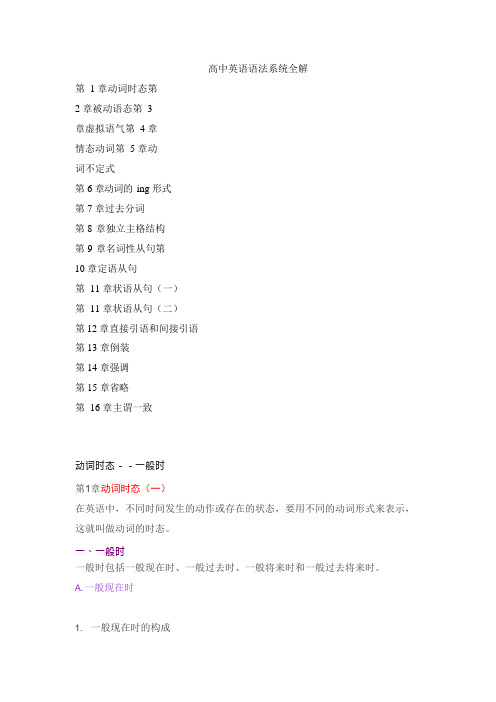
高中英语语法系统全解第1 章动词时态第2 章被动语态第3章虚拟语气第4 章情态动词第5 章动词不定式第6 章动词的ing 形式第7 章过去分词第8 章独立主格结构第9 章名词性从句第10 章定语从句第11 章状语从句(一)第11 章状语从句(二)第12 章直接引语和间接引语第13 章倒装第14 章强调第15 章省略第16 章主谓一致动词时态--一般时第1章动词时态(一)在英语中,不同时间发生的动作或存在的状态,要用不同的动词形式来表示,这就叫做动词的时态。
一、一般时一般时包括一般现在时、一般过去时、一般将来时和一般过去将来时。
A. 一般现在时1. 一般现在时的构成一般现在时主要用动词原形来表示。
主语是第三人称单数时,动词后面要加-s 或-es。
They want good jobs.他们想要好的工作。
The coat matches the dress.外衣和裙子很相配。
This work does not satisfy me.这项工作我不满意。
Do you understand?你懂了吗?2. 一般现在时的用法①一般现在时的基本用法a. 表示现在习惯性的动作或存在状态He always takes a walk after supper.晚饭后他总是散散步。
Everyone is in high spirits now.现在大家都情绪高涨。
b. 表示客观事实或普遍真理The sun rises in the east and sets in the west.太阳从东方升起在西方落下。
Sound travels faster through water than it does through air.声音在水中的传播速度要比在空气中快。
Time and tide wait for no man.时间不等人。
c. 表示主语的特征、能力和状态This cloth feels soft.这布摸上去很软。
(word完整版)高中生英语语法大全(全套),推荐文档
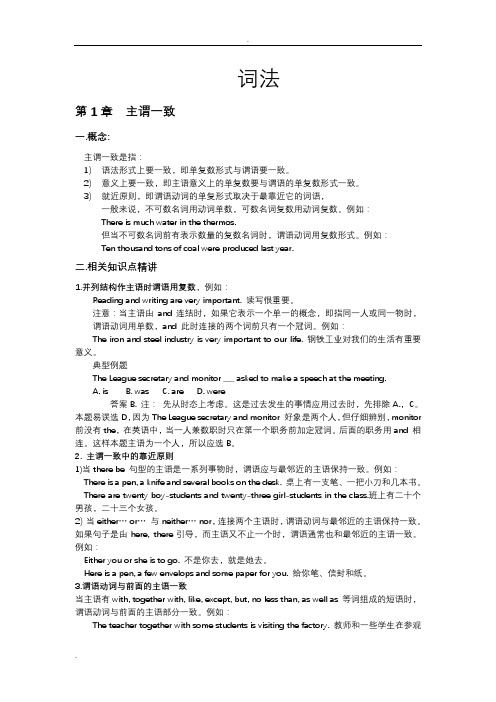
词法第1章主谓一致一.概念:主谓一致是指:1)语法形式上要一致,即单复数形式与谓语要一致。
2)意义上要一致,即主语意义上的单复数要与谓语的单复数形式一致。
3)就近原则,即谓语动词的单复形式取决于最靠近它的词语,一般来说,不可数名词用动词单数,可数名词复数用动词复数。
例如:There is much water in the thermos.但当不可数名词前有表示数量的复数名词时,谓语动词用复数形式。
例如:Ten thousand tons of coal were produced last year.二.相关知识点精讲1.并列结构作主语时谓语用复数,例如:Reading and writing are very important. 读写很重要。
注意:当主语由and连结时,如果它表示一个单一的概念,即指同一人或同一物时,谓语动词用单数,and 此时连接的两个词前只有一个冠词。
例如:The iron and steel industry is very important to our life. 钢铁工业对我们的生活有重要意义。
典型例题The League secretary and monitor ___ asked to make a speech at the meeting.A. isB. wasC. areD. were答案B. 注:先从时态上考虑。
这是过去发生的事情应用过去时,先排除A.,C。
本题易误选D,因为The League secretary and monitor 好象是两个人,但仔细辨别,monitor 前没有the,在英语中,当一人兼数职时只在第一个职务前加定冠词。
后面的职务用and 相连。
这样本题主语为一个人,所以应选B。
2. 主谓一致中的靠近原则1)当there be 句型的主语是一系列事物时,谓语应与最邻近的主语保持一致。
例如:There is a pen, a knife and several books on the desk. 桌上有一支笔、一把小刀和几本书。
高中英语语法大全全课件非常详细(561张PPT)

问题6: Mr Smith has two ______, both of whom are teachers in a school. A.brothers-in-law B.brother-in-laws C.brothers-in-laws D.brothers-in law
以连字符号连接的合成名词一般将中心名词变成 复数,如:managers-in-chief; fathers-in-law。如 果没有中心名词就在该合成词的最后加 –s。如: grown-ups。
高考语法复习
名 词
高考考点分析
1、名词的单、复数; 2、可数与不可数名词的转换;
3、名词作定语;
4、名词的搭配;
5、词语辨析;
问题1: --- How many --- Four. A.stomaches C.stomachs
does a cow have? B.stomach D.stomachies
1. Here’s my card. Let’s keep in __________. (N 1994) (A)
can take as many as you like because they are free of 2. You
_______. (1998 上海) (B)
A. touch
问题1: He gained his _____ by printing _____ of famous writers. (NMET95) A. wealth; work B. wealths; works C. wealths; work D. wealth; works
抽象名词和物质名词被称为不可数名词。本题中 wealth 为不可数名词,works 作“作品”解,属 单复数同形的可数名词。
高中英语语法大全(详细)
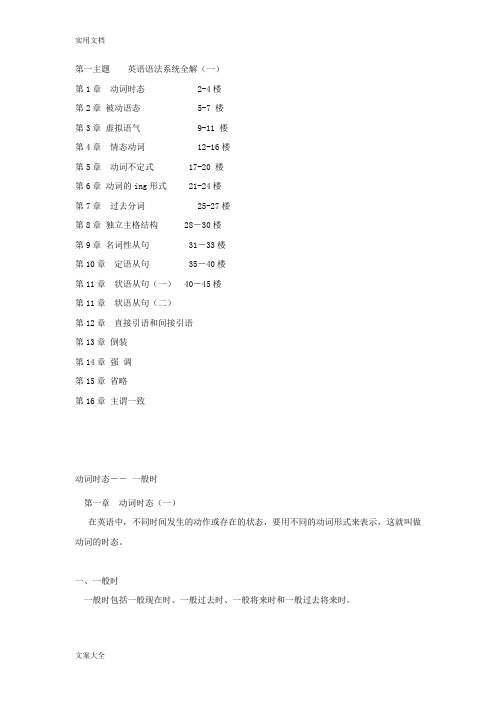
第一主题英语语法系统全解(一)第1章动词时态 2-4楼第2章被动语态 5-7 楼第3章虚拟语气 9-11 楼第4章情态动词 12-16楼第5章动词不定式 17-20 楼第6章动词的ing形式 21-24楼第7章过去分词 25-27楼第8章独立主格结构 28-30楼第9章名词性从句 31-33楼第10章定语从句 35-40楼第11章状语从句(一) 40-45楼第11章状语从句(二)第12章直接引语和间接引语第13章倒装第14章强调第15章省略第16章主谓一致动词时态--一般时第一章动词时态(一)在英语中,不同时间发生的动作或存在的状态,要用不同的动词形式来表示,这就叫做动词的时态。
一、一般时一般时包括一般现在时、一般过去时、一般将来时和一般过去将来时。
A.一般现在时1.一般现在时的构成一般现在时主要用动词原形来表示。
主语是第三人称单数时,动词后面要加-s或-es。
“我’为开头做称呼的是第一人称‘你’怎么怎么样是第二人称‘他她它’是第三人称第三人称就是第三人称转述。
例:小兰对妈妈说:“我要出去玩了”第三人称:小兰对妈妈说,她要出去玩了。
第三人称,就是说是叙述性质的,没有人的语言,是旁白在记叙!以我的角度说,就是第一人称;以和你说的角度说,就是第二人称;站在事情外说事情,他怎么怎么样,那就是第三人称了They want good jobs.他们想要好的工作。
The coat matches the dress.外衣和裙子很相配。
This work does not satisfy me.这项工作我不满意。
Do you understand?你懂了吗?2.一般现在时的用法①一般现在时的基本用法a. 表示现在习惯性的动作或存在状态He always takes a walk after supper.晚饭后他总是散散步。
Everyone is in high spirits now.现在大家都情绪高涨。
b. 表示客观事实或普遍真理The sun rises in the east and sets in the west.太阳从东方升起在西方落下。
高中英语语法详解大全
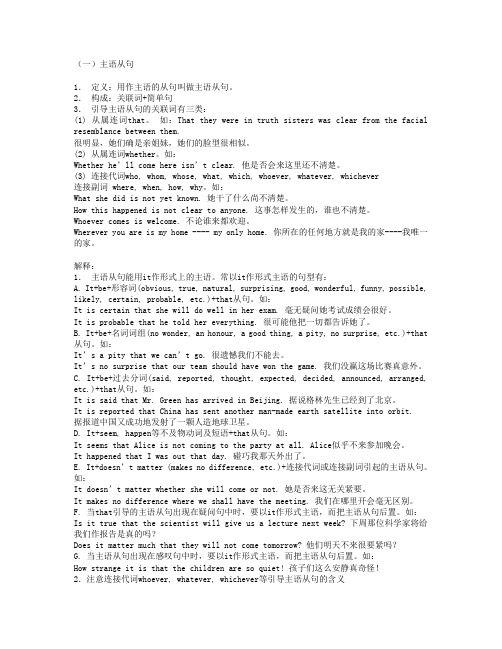
(一)主语从句1.定义:用作主语的从句叫做主语从句。
2.构成:关联词+简单句3.引导主语从句的关联词有三类:(1) 从属连词that。
如:That they were in truth sisters was clear from the facial resemblance between them.很明显,她们确是亲姐妹,她们的脸型很相似。
(2) 从属连词whether。
如:Whether he’ll come here isn’t clear. 他是否会来这里还不清楚。
(3) 连接代词who, whom, whose, what, which, whoever, whatever, whichever连接副词 where, when, how, why。
如:What she did is not yet known. 她干了什么尚不清楚。
How this happened is not clear to anyone. 这事怎样发生的,谁也不清楚。
Whoever comes is welcome. 不论谁来都欢迎。
Wherever you are is my home ---- my only home. 你所在的任何地方就是我的家----我唯一的家。
解释:1.主语从句能用it作形式上的主语。
常以it作形式主语的句型有:A. It+be+形容词(obvious, true, natural, surprising, good, wonderful, funny, possible, likely, certain, probable, etc.)+that从句。
如:It is certain that she will do well in her exam. 毫无疑问她考试成绩会很好。
It is probable that he told her everything. 很可能他把一切都告诉她了。
英语语法总结精选全文完整版

可编辑修改精选全文完整版高中英语语法总结一、 从句1、 名词性从句(1) 主语从句+谓语+宾语主语从句放置在主句中的主语部分)注意:whether …or notWhether(2)主语+谓语+宾语从句(3)主语表语从句(4) 一般为主语+谓语+宾语+同位语从句 (或主语+同位语从句+谓语+宾语)般常用),whether ,how,when,where 。
能跟that 引导的同位语从句的名词有:表信息和消息的名词(news 、information 、message 、report 、rumour 、evidence )表观点、想法和信念的名词(fact 、idea 、belief 、hope 、opinion 、knowledge )表态度和决定的名词(understanding 、conclusion 、impression 、doubt 、illusion 、possibility 、thought )2、 定语从句(1)as 在定语从句中的用法:so …as\such …as\the same …as 等可引导从句;在非限制性定语从句中,as 可以直接指代前面的整个句子。
(3) that 引导的定语从句和同位语从句的区别:同位语从句对先行词进行解释说明,引导的同位语从句是完整的句子,一般先行词只能是表意念、态度等抽象名词;而定语从句是不完整的句子,that 替代先行词。
Eg :同位语从句)定语从句)注意:除以上的状语从句,还有条件状语从句、地点状语从句、结果状语从句、比较状语从句等。
二、 非谓语动词1.doing 一般表正在做某事;而to do 一般表将来将要发生的事情2.不定式和动名词可以做主语、宾语、宾补、定语,其否定式实在前面加not或者never3.不定式和动名词做宾补和定语时有如下形式:(1)主语+谓语+宾语+不定式(表示主语施动于宾语,不定式与宾语呈主动,与主语无关,有表示发生或者未发生)(2)主语+谓语+宾语+动名词(表示动名词与宾语呈主动,与主语无关,且表示正在发生的事情),动名词(表示动名词与主语呈主动,且表示正在发生的事情)三、情态动词Must表肯定推测,can可表否定推测以及疑问推测,may表可能性推测;四、强调句(1)强调谓语动词,直接用助动词do、does、did+动原(2)强调其他,就用强调句型,强调人时可采用that或者who,强调其他部分,均采用that(强调句型:it is/was +强调部分+that…)五、虚拟语气(1)情态动词的虚拟语气:情态动词+have done表示对过去的事情进行虚拟,指本应该做什么而没有做情态动词+not+have+done指没必要做某事,而做了某事。
高中英语语法全英详解无水印

高中英语语法全英详解无水印IMB standardization office【IMB 5AB- IMBK 08- IMB 2C】必修一语法点一:Be+表将来 use the present continuous tense for future plans In English, we have lots of ways of talking about the future. The most common ways of talking about the future we encounter use ‘will’ or ‘be going to’ followed by an infinitive (动词原形), and we tend to use ‘be going to’ most often for talking about future plans.Sometimes, we also use the present continuous tense to talk about future plans.Ex. ①we are going to Mexico next Sunday.② Are you coming to the cinema?③ He is leaving for London in two hours.④ We are spending next winter in Australia.Only some verbs can be used in this situation, such as: go, arrive, come, leave, start, stay, return, play, have, work, wear, spend, see, meet, etc.扩展:What’s the difference between using ‘be going to’ and the present continuous to talk about future plans Let’s look at some more examples:“I’m going to play football on Saturday”You have made a plan in your head but possibly not taken any real action to confirm it. Also, playing football on Saturday is probably not a regular event for you.“I’m playing football on Saturday”You have made a plan and taken some real action to confirm it . called your friends or booked a place to play). In this case, it’s likely that playing football on Saturdays is a common activity for you.语法点二:Direct speech and indirect speech(直接引语和间接引语)Let's first define the terms, then look at how to talk about what someone said, and how to convert speech from direct to indirect or vice-versa.You can answer the question What did he say? in two ways:by repeating the words spoken (direct speech)by reporting the words spoken (indirect or reported speech).Direct speech repeats, or quotes, the exact words spoken. When we use direct speech in writing, we place the words spoken between quotation marks (" ") and there is no change in these words.Reported or indirect speech is usually used to talk about the past, so we normally change the tense of the words spoken. We use reporting verbs like 'say', 'tell', 'ask', and we may use the word 'that' to introduce the reported words. Quotation marks are not used.1、declarative sentence陈述句①Change in pronoun: The pronoun (subject) of the reported speech is changed according to the pronoun of reporting verb or object (person) of reporting verb (first part of sentence). Sometimes the pronoun may not change.In following example the pronoun of reported speech is “I” which will be ch anged in indirect speech into the pronoun (Subject) of reporting verb that is “he”.He said, “I like it very much.”→He said that he liked it very much.②Change in tense: If the first part of sentence (reporting verb part) belongs to past tense the tense of reported speech will change. If the first part of sentence (reporting verb part) belongs to present or future tense, the tense of reported speech will not change.③Change in demonstrative pronoun指示代词, temporal adverbial时间状语, adverbial of place地点状语 and verbs.Ps:(1)if the direct speech indicates objective truth, then there is no change in tense when it’s converted to indirect speech.Ex. He said, “Light travels much faster than sound.”→He said that light travels much faster than sound.(2) 如果在当地转述,here不必改成there,come不必改为go,如果在当天转述,yesterday, tomorrow等时间状语也不必改变。
完整word版,高中英语语法大全(K12教育文档)
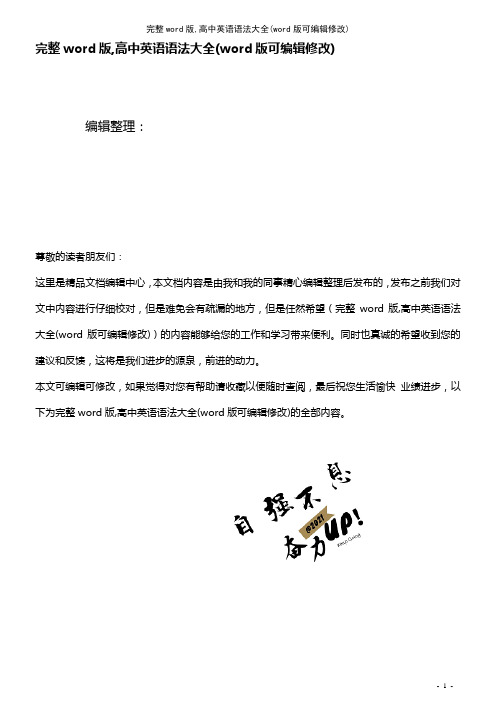
完整word版,高中英语语法大全(word版可编辑修改)编辑整理:尊敬的读者朋友们:这里是精品文档编辑中心,本文档内容是由我和我的同事精心编辑整理后发布的,发布之前我们对文中内容进行仔细校对,但是难免会有疏漏的地方,但是任然希望(完整word版,高中英语语法大全(word版可编辑修改))的内容能够给您的工作和学习带来便利。
同时也真诚的希望收到您的建议和反馈,这将是我们进步的源泉,前进的动力。
本文可编辑可修改,如果觉得对您有帮助请收藏以便随时查阅,最后祝您生活愉快业绩进步,以下为完整word版,高中英语语法大全(word版可编辑修改)的全部内容。
高中英语语法目录高中英语语法总结大全之名词 (11)高中英语语法总结大全之名词 (11)名词概论 (11)其它名词复数的规则变化 (12)名词复数的不规则变化 (13)不可数名词量的表示 (14)定语名词的复数 (14)不同国家的人的单复数 (15)名词的格 (15)高中英语语法总结大全之代词 (16)人称代词的用法 (16)人称代词之主、宾格的替换 (16)代词的指代问题 (17)并列人称代词的排列顺序 (17)物主代词 (17)双重所有格 (18)反身代词 (18)相互代词 (19)指示代词 (20)疑问代词 (21)关系代词 (22)every, no, all, both,。
.. (22)none, few, some, any,... .. (23)代词比较辩异one, that和it (24)one/another/the other (24)”the”的妙用 (25)anyone/any one;。
. (25)both, either, neither,..。
(26)many, much (26)few, little, a few,... . (26)高中英语语法总结大全之冠词和数词 (27)不定冠词的用法 (27)定冠词的用法 (27)零冠词的用法 (28)冠词与形容词+名词结构 (29)冠词位置 (29)数词 (30)形容词及其用法 (31)以—ly结尾的形容词 (31)用形容词表示类别和整体 (31)多个形容词修饰名词的顺序 (32)副词及其基本用法 (32)兼有两种形式的副词 (33)形容词与副词的比较级 (34)as+形容词或副词原级+as (35)比较级形容词或副词+than (35)可修饰比较级的词 (36)many, old和far (36)the+最高级+比较范围 (37)和more有关的词组 (37)高中英语语法总结大全之动词 (38)动词 (38)系动词 (39)助动词be的用法 (40)助动词have的用法 (41)助动词do 的用法 (41)助动词shall和will的用法 (42)助动词should, would的用法 (42)短语动词 (43)非谓语动词 (43)高中英语语法总结大全之动词的时态 (43)一般现在时的用法 (43)一般过去时的用法 (44)used to/be used to (45)一般将来时 (45)be going to/will (46)be to和be going to (46)一般现在时表将来 (46)用现在进行时表示将来 (46)现在完成时 (46)比较过去时与现在完成时 (47)用于现在完成时的句型 (48)比较since和for (48)since的四种用法 (49)延续动词与瞬间动词 (49)过去完成时 (50)用一般过去时代替完成时 (50)将来完成时 (51)现在进行时 (51)不用进行时的动词 (51)过去进行时 (52)将来进行时 (52)一般现在时代替将来时 (53)一般现在时代替过去时 (53)一般现在时代替完成时 (53)一般现在时代替进行时 (54)现在进行时代替将来时 (54)时态一致 (54)时态与时间状语 (54)高中英语语法总结大全之动词的语态 (54)动词的语态 (54)let 的用法 (55)短语动词的被动语态 (55)表示"据说"或"相信”的词组 (55)不用被动语态的情况 (55)主动形式表示被动意义 (56)被动形式表示主动意义 (57)need/want/require/worth (57)高中英语语法总结大全之虚拟语气 (57)虚拟语气 (57)真实条件句 (57)非真实条件句 (58)混合条件句 (59)虚拟条件句的倒装 (59)特殊的虚拟语气词:should (59)wish的用法 (60)比较if only与only if (61)It is (high) time that (61)need”不必做”和”本不该做” (61)高中英语语法总结大全之情态动词 (61)情态动词的语法特征 (61)比较can 和be able to (62)比较may和might (62)比较have to和must (62)must表示推测 (63)表示推测的用法 (63)情态动词+have+过去分词 (64)should和ought to (64)had better表示最好 (65)would rather表示”宁愿” (65)will和would (65)情态动词的回答方式 (66)带to的情态动词 (66)比较need和dare (67)高中英语语法总结大全之动词不定式 (67)不定式作宾语 (67)不定式作补语 (68)不定式主语 (69)It’s for sb/It's of sb (69)不定式作表语 (70)不定式作定语 (70)不定式作状语 (70)用作介词的to (70)省to 的动词不定式 (71)动词不定式的否定式 (71)不定式特殊句型too...to.. (72)不定式特殊句型so as to (72)不定式特殊句型Why not (73)不定式的时态和语态 (73)动名词与不定式 (73)高中英语语法总结大全之分词 (74)分词作定语 (74)连词+分词(短语) (75)分词作补语 (75)分词作表语 (75)分词作插入语 (75)分词的时态 (76)分词的语态 (76)高中英语语法总结大全之独立主格 (77)独立主格 (77)With的复合结构 (77)高中英语语法总结大全之特殊词精讲 (78)stop doing/to do (78)forget doing/to do (79)remember doing/to do (79)regret doing/to do (79)cease doing/to do (80)try doing/to do (80)go on doing/to do (80)be afraid doing/to do (80)be interested doing/。
(完整)高中英语语法大全,推荐文档

高中英语语法目录高中英语语法总结大全之名词 (10)高中英语语法总结大全之名词 (10)名词概论 (10)其它名词复数的规则变化 (11)名词复数的不规则变化 (12)不可数名词量的表示 (12)定语名词的复数 (13)不同国家的人的单复数 (13)名词的格 (14)高中英语语法总结大全之代词 (14)人称代词的用法 (14)人称代词之主、宾格的替换 (15)代词的指代问题 (15)并列人称代词的排列顺序 (15)物主代词 (16)双重所有格 (16)反身代词 (16)相互代词 (17)指示代词 (18)疑问代词 (19)关系代词 (20)代词比较辩异one, that和it (22)one/another/the other (22)"the"的妙用 (23)anyone/any one;... (23)both, either, neither,... (23)many, much (24)few, little, a few,... .. (24)高中英语语法总结大全之冠词和数词 (25)不定冠词的用法 (25)定冠词的用法 (25)零冠词的用法 (26)冠词与形容词+名词结构 (26)冠词位置 (27)数词 (27)形容词及其用法 (28)以-ly结尾的形容词 (28)用形容词表示类别和整体 (29)多个形容词修饰名词的顺序 (29)副词及其基本用法 (29)兼有两种形式的副词 (30)形容词与副词的比较级 (31)as+形容词或副词原级+as (32)many, old和far (33)the+最高级+比较范围 (33)和more有关的词组 (34)高中英语语法总结大全之动词 (34)动词 (34)系动词 (35)助动词be的用法 (37)助动词have的用法 (37)助动词do 的用法 (37)助动词shall和will的用法 (38)助动词should, would的用法 (38)短语动词 (39)非谓语动词 (39)高中英语语法总结大全之动词的时态 (39)一般现在时的用法 (40)一般过去时的用法 (40)used to/be used to (41)一般将来时 (41)be going to/will (42)be to和be going to (42)一般现在时表将来 (42)用现在进行时表示将来 (42)比较过去时与现在完成时 (42)用于现在完成时的句型 (43)比较since和for (44)since的四种用法 (44)延续动词与瞬间动词 (45)过去完成时 (45)用一般过去时代替完成时 (46)将来完成时 (46)现在进行时 (46)不用进行时的动词 (47)过去进行时 (47)将来进行时 (48)一般现在时代替将来时 (48)一般现在时代替过去时 (48)一般现在时代替完成时 (49)一般现在时代替进行时 (49)现在进行时代替将来时 (49)时态一致 (49)时态与时间状语 (49)高中英语语法总结大全之动词的语态 (49)动词的语态 (49)let 的用法 (50)短语动词的被动语态 (50)被动形式表示主动意义 (51)need/want/require/worth (52)高中英语语法总结大全之虚拟语气 (52)虚拟语气 (52)真实条件句 (52)非真实条件句 (53)混合条件句 (53)虚拟条件句的倒装 (53)特殊的虚拟语气词:should (54)wish的用法 (55)比较if only与only if (55)It is (high) time that (55)need"不必做"和"本不该做" (55)高中英语语法总结大全之情态动词 (56)情态动词的语法特征 (56)比较can 和be able to (56)比较may和might (56)比较have to和must (57)must表示推测 (57)表示推测的用法 (58)情态动词+have+过去分词 (58)will和would (59)情态动词的回答方式 (60)带to的情态动词 (60)比较need和dare (60)高中英语语法总结大全之动词不定式 (61)不定式作宾语 (61)不定式作补语 (61)不定式主语 (62)It's for sb/It's of sb (63)不定式作表语 (63)不定式作定语 (63)不定式作状语 (63)用作介词的to (64)省to 的动词不定式 (64)动词不定式的否定式 (65)不定式特殊句型too...to.. (65)不定式特殊句型so as to (66)不定式特殊句型Why not (66)不定式的时态和语态 (66)动名词与不定式 (66)高中英语语法总结大全之分词 (67)分词作补语 (68)分词作表语 (68)分词作插入语 (69)分词的时态 (69)分词的语态 (69)高中英语语法总结大全之独立主格 (70)独立主格 (70)With的复合结构 (70)高中英语语法总结大全之特殊词精讲 (71)stop doing/to do (71)forget doing/to do (71)remember doing/to do (72)regret doing/to do (72)cease doing/to do (72)try doing/to do (73)go on doing/to do (73)be afraid doing/to do (73)be interested doing/... (73)mean doing/to do (73)begin(start) doing/to do (74)感官动词+ doing/to do (74)感叹句结构 (76)强调句结构 (77)用助动词进行强调 (77)反意疑问句 (77)高中英语语法总结大全之连词 (80)连词 (80)并列连词与并列结构 (80)比较and和or (81)表示选择的并列结构 (81)表示转折或对比 (82)表原因关系 (82)比较so和such (82)高中英语语法总结大全之主谓一致 (83)主谓一致 (83)并列结构作主语谓语用复数 (83)主谓一致中的靠近原则 (83)谓语动词与前面的主语一致 (83)谓语需用单数 (84)指代意义决定谓语的单复数 (84)与后接名词或代词保持一致 (84)高中英语语法总结大全之名词性从句 (85)名词性wh-从句 (86)if, whether引导的名词从句 (87)否定转移 (87)高中英语语法总结大全之状语从句 (88)地点状语从句 (88)方式状语从句 (88)原因状语从句 (89)目的状语从句 (89)结果状语从句 (89)条件状语从句 (89)让步状语从句 (90)比较while, when, as (91)比较until和till (91)表示"一...就..."的结构.. (92)高中英语语法总结大全之定语从句 (92)定语从句 (92)关系代词引导的定语从句 (92)关系副词引导的定语从句 (93)判断关系代词与关系副词 (93)限制性和非限制性定语从句 (94)介词+关系词 (94)关系代词that的用法 (95)高中英语语法总结大全之倒装 (96)倒装句之全部倒装 (96)倒装句之部分倒装 (96)以否定词开头作部分倒装 (97)so, either, nor作部分倒装 (97)only在句首要倒装的情况 (98)as, though引导的倒装句 (98)其他部分倒装 (98)高中英语语法总结大全之名词词名词概论名词可以分为专有名词(Proper Nouns)和普通名词(Common Nouns),专有名词是某个(些)人,地方,机构等专有的名称,如Beijing,China等。
(完整word版)语法全解-星火英语
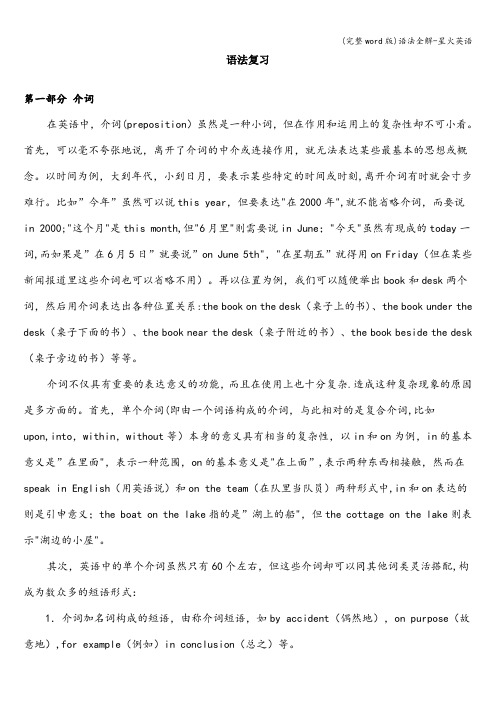
语法复习第一部分介词在英语中,介词(preposition)虽然是一种小词,但在作用和运用上的复杂性却不可小看。
首先,可以毫不夸张地说,离开了介词的中介或连接作用,就无法表达某些最基本的思想或概念。
以时间为例,大到年代,小到日月,要表示某些特定的时间或时刻,离开介词有时就会寸步难行。
比如”今年”虽然可以说this year,但要表达"在2000年",就不能省略介词,而要说in 2000;"这个月"是this month,但"6月里"则需要说in June;"今天"虽然有现成的today一词,而如果是”在6月5日”就要说”on June 5th","在星期五”就得用on Friday(但在某些新闻报道里这些介词也可以省略不用)。
再以位置为例,我们可以随便举出book和desk两个词,然后用介词表达出各种位置关系:the book on the desk(桌子上的书)、the book under the desk(桌子下面的书)、the book near the desk(桌子附近的书)、the book beside the desk (桌子旁边的书)等等。
介词不仅具有重要的表达意义的功能,而且在使用上也十分复杂.造成这种复杂现象的原因是多方面的。
首先,单个介词(即由一个词语构成的介词,与此相对的是复合介词,比如upon,into,within,without等)本身的意义具有相当的复杂性,以in和on为例,in的基本意义是”在里面",表示一种范围,on的基本意义是"在上面”,表示两种东西相接触,然而在speak in English(用英语说)和on the team(在队里当队员)两种形式中,in和on表达的则是引申意义;the boat on the lake指的是”湖上的船",但the cottage on the lake则表示"湖边的小屋"。
高中英语语法讲解 pdf
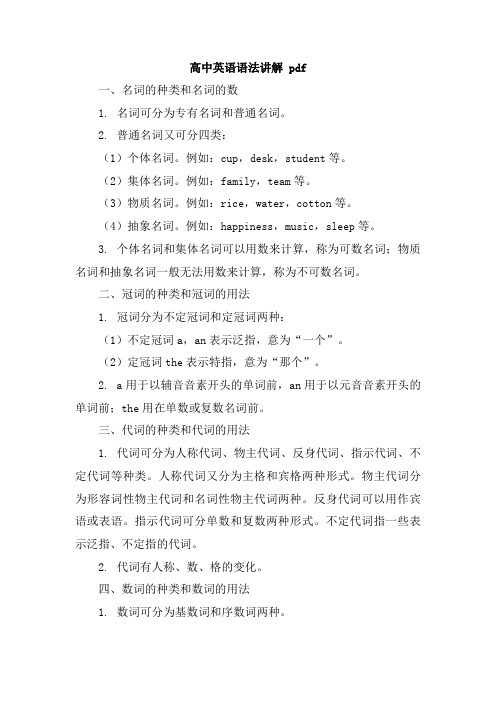
高中英语语法讲解pdf一、名词的种类和名词的数1.名词可分为专有名词和普通名词。
2.普通名词又可分四类:(1)个体名词。
例如:cup,desk,student等。
(2)集体名词。
例如:family,team等。
(3)物质名词。
例如:rice,water,cotton等。
(4)抽象名词。
例如:happiness,music,sleep等。
3.个体名词和集体名词可以用数来计算,称为可数名词;物质名词和抽象名词一般无法用数来计算,称为不可数名词。
二、冠词的种类和冠词的用法1.冠词分为不定冠词和定冠词两种:(1)不定冠词a,an表示泛指,意为“一个”。
(2)定冠词the表示特指,意为“那个”。
2.a用于以辅音音素开头的单词前,an用于以元音音素开头的单词前;the用在单数或复数名词前。
三、代词的种类和代词的用法1.代词可分为人称代词、物主代词、反身代词、指示代词、不定代词等种类。
人称代词又分为主格和宾格两种形式。
物主代词分为形容词性物主代词和名词性物主代词两种。
反身代词可以用作宾语或表语。
指示代词可分单数和复数两种形式。
不定代词指一些表示泛指、不定指的代词。
2.代词有人称、数、格的变化。
四、数词的种类和数词的用法1.数词可分为基数词和序数词两种。
2.基数词表示数量,序数词表示次序。
3.数词常用来表示数量、顺序和编号等。
五、介词的种类和介词的用法1.介词可分为简单介词、复合介词和短语介词三类。
2.介词常用来表示时间、地点、方式、原因、目的等。
3.介词后面一般接名词或代词作宾语,表示与其他事物的关系。
六、形容词的种类和形容词的用法1.形容词可分为描述性形容词和限定性形容词两类。
描述性形容词表示事物的性质和特征;限定性形容词用来修饰名词,表示所属关系。
2.形容词在句子中可以作定语、表语或补足语等成分。
修饰名词时放在名词之前,称为前置修饰语;作表语或补足语时放在名词之后,称为后置修饰语。
3.形容词可以比较级和最高级的形式出现,表示程度的差异。
高中英语语法~最佳详尽版!
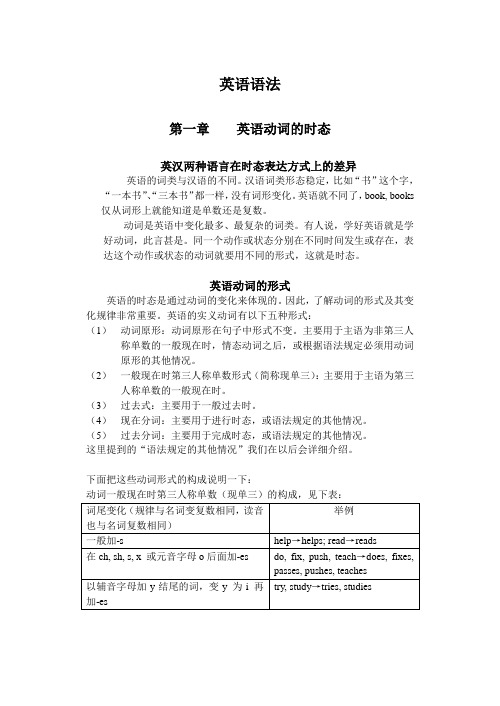
英语语法第一章英语动词的时态英汉两种语言在时态表达方式上的差异英语的词类与汉语的不同。
汉语词类形态稳定,比如“书”这个字,“一本书”、“三本书”都一样,没有词形变化。
英语就不同了,book, books 仅从词形上就能知道是单数还是复数。
动词是英语中变化最多、最复杂的词类。
有人说,学好英语就是学好动词,此言甚是。
同一个动作或状态分别在不同时间发生或存在,表达这个动作或状态的动词就要用不同的形式,这就是时态。
英语动词的形式英语的时态是通过动词的变化来体现的。
因此,了解动词的形式及其变化规律非常重要。
英语的实义动词有以下五种形式:(1)动词原形:动词原形在句子中形式不变。
主要用于主语为非第三人称单数的一般现在时,情态动词之后,或根据语法规定必须用动词原形的其他情况。
(2)一般现在时第三人称单数形式(简称现单三):主要用于主语为第三人称单数的一般现在时。
(3)过去式:主要用于一般过去时。
(4)现在分词:主要用于进行时态,或语法规定的其他情况。
(5)过去分词:主要用于完成时态,或语法规定的其他情况。
这里提到的“语法规定的其他情况”我们在以后会详细介绍。
下面把这些动词形式的构成说明一下:动词一般现在时第三人称单数(现单三)的构成,见下表:动词过去式和过去分词,大多数是动词原形+ ed 构成,这是规则动词。
规不规则动词的过去式和过去分词有其特殊变化形式,需要个别记忆,同时也要善于发现不规则中的规则,即某些字母组合的不规则动词有一定的规律。
如weep→ wept, sleep →slept, sweep →swept为了学习的方便,人们把时间分为四个阶段:“现在、过去、将来、过去将来”。
英语动词所表示的动作在以上每个时间段中分别有四种状态:一般、进行、完成和完成进行。
因此我们便有了四四一十六个时态。
不同的时“时态”就是通过动词的形态变化,来表达动作发生的时间(现在、过去、将来、过去将来)及所处的状态(一般、进行、完成、完成进行)。
高中英语语法大全归纳总结.docx
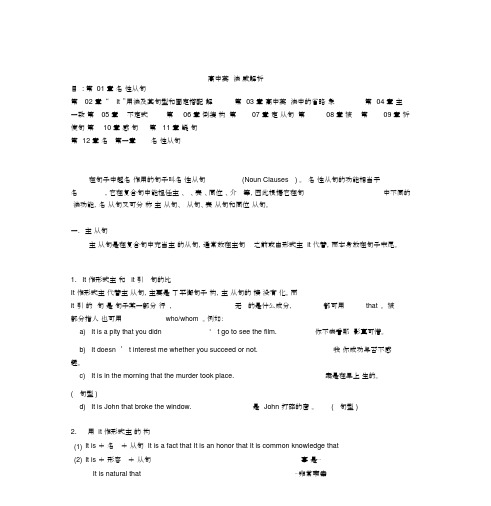
高中英法威解析目 : 第 01 章名性从句第02 章“It”用法及其句型和固定搭配解第03 章高中英法中的省略象第04 章主一致第05 章不定式第06 章倒装构第07 章定从句第08 章被第09 章祈使句第10 章感句第11 章疑句第12 章名第一章名性从句在句子中起名作用的句子叫名性从句(Noun Clauses ) 。
名性从句的功能相当于名, 它在复合句中能担任主、、表、同位、介等,因此根据它在句中不同的法功能,名从句又可分称主从句、从句、表从句和同位从句。
一.主从句主从句是在复合句中充当主的从句,通常放在主句之前或由形式主 it 代替,而本身放在句子末尾。
1.It 作形式主和 it 引句的比It 作形式主代替主从句,主要是了平衡句子构,主从句的接没有化。
而it引的句是句子某一部分行,无的是什么成分,都可用that。
被部分指人也可用who/whom。
例如:a)It is a pity that you didn't go to see the film.你不去看那影真可惜。
b)It doesn't interest me whether you succeed or not.我你成功与否不感趣。
c) It is in the morning that the murder took place.案是在早上生的。
( 句型 )d) It is John that broke the window.是John打碎的窗。
( 句型 )2.用 it 作形式主的构(1)It is +名+从句 It is a fact that It is an honor that It is common knowledge that(2)It is +形容+从句事是⋯It is natural that⋯非常荣幸⋯是常很自然⋯It is strange that奇怪的是⋯(3)It is +不及物+从句It seems that ⋯似乎⋯It happened that碰巧⋯It appears that似乎⋯(4)It +去分+从句 It is reported that It has beenproved that It is said that⋯据道⋯3.已⋯主从句不可位于句首的五种情况:据⋯(1)if 引的主从句不可居于复合句句首。
高中英语语法大全-精讲教程,推荐文档
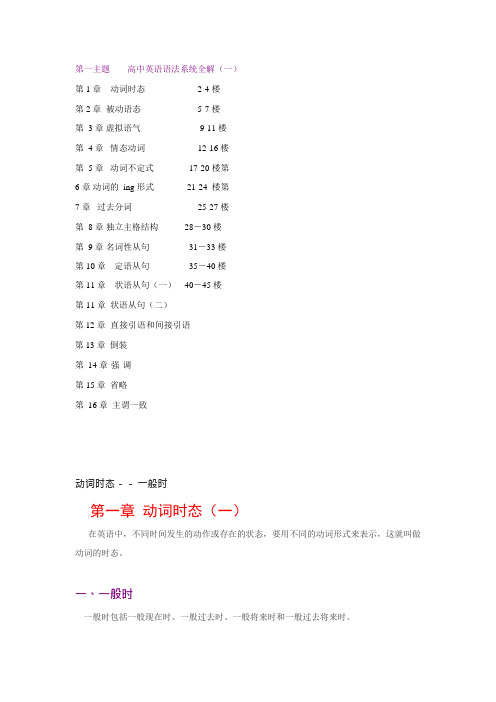
第一主题高中英语语法系统全解(一)第1 章第2 章动词时态被动语态2-4 楼5-7 楼第3 章虚拟语气9-11 楼第4 章情态动词12-16 楼第5 章动词不定式17-20 楼第6 章动词的ing 形式21-24 楼第7 章过去分词25-27 楼第8 章独立主格结构28-30 楼第9 章名词性从句31-33 楼第10 章定语从句35-40 楼第11 章状语从句(一)40-45 楼第11 章状语从句(二)第12 章直接引语和间接引语第13 章倒装第14 章强调第15 章省略第16 章主谓一致动词时态--一般时第一章动词时态(一)在英语中,不同时间发生的动作或存在的状态,要用不同的动词形式来表示,这就叫做动词的时态。
一、一般时一般时包括一般现在时、一般过去时、一般将来时和一般过去将来时。
A. 一般现在时1. 一般现在时的构成一般现在时主要用动词原形来表示。
主语是第三人称单数时,动词后面要加-s 或-es。
They want good jobs.他们想要好的工作。
The coat matches the dress.外衣和裙子很相配。
This work does not satisfy me.这项工作我不满意。
Do you understand?你懂了吗?2. 一般现在时的用法①一般现在时的基本用法a. 表示现在习惯性的动作或存在状态He always takes a walk after supper.晚饭后他总是散散步。
Everyone is in high spirits now.现在大家都情绪高涨。
b. 表示客观事实或普遍真理The sun rises in the east and sets in the west.太阳从东方升起在西方落下。
Sound travels faster through water than it does through air.声音在水中的传播速度要比在空气中快。
- 1、下载文档前请自行甄别文档内容的完整性,平台不提供额外的编辑、内容补充、找答案等附加服务。
- 2、"仅部分预览"的文档,不可在线预览部分如存在完整性等问题,可反馈申请退款(可完整预览的文档不适用该条件!)。
- 3、如文档侵犯您的权益,请联系客服反馈,我们会尽快为您处理(人工客服工作时间:9:00-18:30)。
必修一语法点一:Be+v.ing表将来use the present continuous tense for future plans In English, we have lots of ways of talking about the future. The most common ways of talking about the future we encounter use ‘will’ or ‘be going to’ followed by an infinitive(动词原形), and we tend to use ‘be going to’ most often for talking about future plans. Sometimes, we also use the present continuous tense to talk about future plans.Ex. ①we are going to Mexico next Sunday.②Are you coming to the cinema?③He is leaving for London in two hours.④We are spending next winter in Australia.Only some verbs can be used in this situation, such as: go, arrive, come, leave, start, stay, return, play, have, work, wear, spend, see, meet, etc.扩展:What’s the difference between using ‘be going to’ and the present continuous to talk about future plans? Let’s look at some more examples:“I’m going to play football on Saturday”You have made a plan in your head but possibly not taken any real action to confirm it. Also, playing football on Saturday is probably not a regular event for you.“I’m playing football on Saturday”You have made a plan and taken some real action to confirm it (e.g. called your friends or booked a place to play). In this case, it’s likely that playing football on Saturdays is a common activity for you.语法点二:Direct speech and indirect speech(直接引语和间接引语)Let's first define the terms, then look at how to talk about what someone said, and how to convert speech from direct to indirect or vice-versa.You can answer the question What did he say? in two ways:by repeating the words spoken (direct speech)by reporting the words spoken (indirect or reported speech).Direct speech repeats, or quotes, the exact words spoken. When we use direct speech in writing, we place the words spoken between quotation marks (" ") and there is no change in these words.Reported or indirect speech is usually used to talk about the past, so we normally change the tense of the words spoken. We use reporting verbs like 'say', 'tell', 'ask', and we may use the word 'that' to introduce the reported words. Quotation marks are not used.1、declarative sentence陈述句①Change in pronoun: The pronoun (subject) of the reported speech is changed according to the pronoun of reporting verb or object (person) of reporting verb (first part of sentence). Sometimes the pronoun may not change.In following example the pronoun of reported speech is “I” which will be changed in indirect speech into the pronoun (Subject) of reporting verb that is “he”.He said, “I like it very much.”→He said that he liked it very much.②Change in tense: If the first part of sentence (reporting verb part) belongs to past tense the tense of reported speech will change. If the first part of sentence (reporting verb part) belongs to present orfuture tense, the tense of reported speech will not change.③Change in demonstrative pronoun指示代词, temporal adverbial时间状语, adverbial of place地点状语and verbs.Ps:(1)if the direct speech indicates objective truth, then there is no change in tense when it’s converted to indirect speech.Ex. He said, “Light travels much faster than sound.”→He said that light travels much faster than sound.(2) 如果在当地转述,here不必改成there,come不必改为go,如果在当天转述,yesterday, tomorrow等时间状语也不必改变。
2、imperative sentence祈使句Imperative sentences do not normally have an expressed subject. In order to change an imperative sentence into the indirect speech, we use a to-infinitive. Note that instead of ‘said’ we use one of the following reporting verbs:Ask, Tell, Advise, command, request, order, forbid, decree, propose etc.If the imperative sentence is in negative form, then add ‘not’ in front of to-infinitive when convert the speech.Ex.①The hostess said to us, “Please sit down.”→The hostess asked us to sit down.②He said, “Don’t make so much noise, boys.”→He told the boys to not to make so much noise.3、interrogative sentence疑问句Turn word order in interrogative sentence into that in declarative sentence, and use a full stop in the end. The subject, tense, adverbial etc have to change accordingly.(1)general question一般疑问句General questions are changed into the indirect speech by using the connective if or whether. The reporting verb say or said changes to ask or asked.Ex. He said, “Are you interested in English?”→He asked (me) if I was interested in English.(2)special questionSpecial questions are changed into the indirect speech by using the same interrogative.Ex. “What do you want?” he asked me.→He asked me what I wanted.语法点三:The Attributive Clause定语从句Attributive clause is a sentence that is used to modify a noun or a pronoun to make clear which person or thing we are talking about.Ex. The man who lives next to us sells vegetable.You must do everything that I do.In the two examples above, man and everything are called antecedents先行词. Who lives next to us and that I do are attributive clauses. Who and that are relative pronoun关系代词. The words to connect main clause and attributive clause are divided into two groups, they are relative pronouns, namely that, which, who, whom, whose, and relative adverbs, namely where, when, why.Relative pronouns: We use who and whom for people, and which for things. We use that for people or things.1.That, which, who2.WhoseWhose replaces a genitive noun名词所有格in an attributive clause. The antecedent can be thing or person.Ex. This is the scientist whose name is known all over the world.The room whose window faces south is mine.3.When, where, whyFirst, when the antecedent is about reason, and it acts as an adv in the attributive clause, we will use “why”. Second, when the antecedent is about time, and it plays the role of an adv,“when” will be used. Third, when the antecedent is about place, playing the role of an adv of place, we will consider adopting where.必修二语法点一:(接定从讲)4.The restrictive and non-restrictive attributive clause.限制性和非限制性(1)Restrictive clauses limit the possible meaning of a preceding subject. They are usually notmarked by pauses in speech, and they are not set off by commas in writing. Sometimes the relative pronoun which serves as an object in clause can be omitted.Ex. What is the name of the tall man who just came in?Beijing is a city (that) I’ve always wanted to visit.He has found the book (that) he was looking for.(2)Nonrestrictive clauses tell you something about a preceding subject, but they do not limit, orrestrict, the meaning of that subject. They are usually marked by brief pauses in speech and are usually set off by commas in writing. Relative cannot be omitted.Ex. Beijing, which is the capital of China, has a very long history.Yesterday I met Li Ping, who seemed to be very busy.Ps: ①In restrictive attributive clause, relative adverbs behind time or place sometimes can be omitted in spoken English.Ex. That was the year (when) I first went abroad.We need a place (where) we can stay for a few days.②Why clause can only modified ‘reason’ and it can be converted to ‘for which’. In spoken English, we can also use ‘that’ or just omit the relative.Ex. The reason (why/for which/that) I bought the roses is that Mary likes them.③‘How’cannot be used as relative adverbs. We use in which, that, or no relative to modify ‘way’.Ex. This is the way (how) I did it. (wrong)This is the way(in which/that) I did it. (correct)④the attributive clause can also be called as relative clause.语法点二:The passive voiceWe have learned the passive voice of the simple present tense and simple past tense.1.The simple future tense (use ask as an example)Ps: affirmative form; negative form; interrogative form2.The present perfect tense3.The present continuous tense4.Phrasal verb短语动词Normally, only transitive verbs can be used in passive voice, but with the addition of preposition or adverb to intransitive verbs, some phrasal verbs serve as transitive verbs, so they have passive voice too. Pay attention, we can’t miss any part of phrasal verb when we change it into passive voice.At last they put out the fire. →At last the fire was put out.They will put up a notice on the wall. →A notice will be put up on the wall.Have you sent for a doctor? →Has the doctor been sent for?Ps:必修三语法点一:modal verbs情态动词A modal verb is a type of verb that is used to indicate modality – that is: likelihood, ability, permission, and obligation. They have to be used with infinitive.Can-could may-might shall-should will-would have to-had to must1.Can & couldThey can be used to indicate ability, permission, possibility, etc.Ps:Possibility:We use the modal can to make general statements about what is possible:It can be very cold in winter. (= It is sometimes very cold in winter)We use could as the past tense of can:It could be very cold in winter. (=Sometimes it was very cold in winter.)We use could to show that something is possible in the future, but not certain:If we don’t hurry we could be late. (=Perhaps/Maybe we will be late)We use could have to show that something is/was possible now or at some time in the past: It’s ten o’clock. They could have arrived now.Permission:We use can to ask for permission to do something or give permission; could is more formal and polite than can.2.May & mightPs: The negative forms are may not and might not.We use may:①when we are not sure about something:Jack may be coming to see us tomorrow.②to make polite requests:May I borrow the car tomorrow?③When we use may not for a refusal it is emphatic:You may not borrow the car until you can be more careful with it. We use might:①when we are not sure about something:I might see you tomorrow.It’s quite bright. It might not rain today.②As the past tense of may for requests:He asked if he might borrow the car.③For very polite requests:Might I ask you a question?3.Must & have toPs:Must①We use 'must' to express a strong obligation. When we use 'must' this usually means that somepersonal circumstance makes the obligation necessary (and the speaker almost certainly agrees with the obligation.). Its negative form is must not, but when we answer a must question, we use need not or don’t have to.②We can use 'must' to show that we are certain something is true. We are making a logicaldeduction based upon some clear evidence or reason.Have toWe can also use 'have to' to express a strong obligation. When we use 'have to' this usually means that some external circumstance makes the obligation necessary. But must indicate the speaker’s subjective opinion, have to refers to objective one.4.Shall & should5.Will & would6.oughtOught to is a semi-modal verb because it is in some ways like a modal verb and in some ways like a main verb. For example, unlike modal verbs, it is followed by to, but like modal verbs, it does not change form for person. The negative is formed by adding ‘not’ after ought (ought not to).语法点二:Noun clausesA noun clause is a clause that plays the role of a noun. The object clause, the predicative clause, the subject clause, the appositive clause同位语从句.1.The objective clauseIt is a clause that functions like a noun object. It begins with conjunctions that, if, whether, conjunctional pronoun who, whose, what, which and conjunctional adverbs when, where, how, why, etc.2.The predicative clauseIt is a clause that functions as the predicative. It begins with conjunctions that, as if, whether, conjunctional pronoun who, what, which and conjunctional adverbs when, where, how, why, etc.3.Subject clauseIt is a clause that functions as the subject. It begins with conjunctions that, whether, conjunctional pronoun who, what, which and conjunctional adverbs when, where, how, why, etc.4.The appositive clauseIt’s a clause serves as the appositive to explain the preceding noun, which usually are fact, idea, news, promise etc. It begins with conjunction that, conjunctional adverb how, when, where, etc.必修四语法点一:Agreement between subject and verb主语和谓语动词的一致1.Subjects and verbs must agree in number and person.2.If two subjects are joined by ‘and’, they typically require a plural verb form.3.Do you use a singular or plural verb to match a collective noun such as team or staff? Theanswer is, it depends. If these nouns are acting as a unit, use a singular verb. If the sentence indicates more individuality, use a plural verb.My family is a large one.The family are sitting at the breakfast table.This group is having a meeting.Our group are reading the newspapers.4.When indefinite pronoun like anyone, anybody, anything, everyone, everything, someone,somebody, something, no one, nobody, nothing, each, the other, etc serves as the subject, use a singular verb.Is anybody going to tell him the news?There is nobody in the house.Everything is ready.5.Pronoun ‘none’ and ‘neither’ can use either singular verb or plural verb and it depends onspeaker’s intention. But when ‘none’ and ‘neither’ stand for uncountable noun, they are considered as singular; when neither functions as an adjective to modify a singular noun, the predicate verb should be singular.6.The verb in an ‘or’, ‘either…or’, ‘neither…nor’ or ‘not only…but also’ sentence agrees with thenoun or pronoun closest to it.Either you or Jane is to be sent to New Zealand.Neither he nor I have finished the experiment.7.In sentences beginning with here or there, the true subject follows the verb.There are four hurdles to jump.There is a high hurdle to jump.Here are the keys.8.Sometimes the subject is separated from the verb by such words as with, along with, togetherwith, as well as, like, except, besides, including, in addition to, etc. These words and phrases are not part of the subject. Ignore them and use a singular verb when the subject is singular.The teacher with two students was at the meeting.The girl as well as the boys has learned to drive a car.9.Plural nouns that indicates time, money, distance, weight is considered as a whole when they areused as the number of a unit, so the predicate verb should be singular.Sixty years is a long time.Ten dollars is enough for him.Three thousand miles is a long distance.语法点二:the verb -ing formSubject, object, predicative, attribute, object complement, adverbial语法三:构词法word formationpounding 合成2.Conversion 转化The characteristic of a certain word词性3.Derivation 派生Prefix前缀,suffix后缀,root词根Dis, un, in, im, non, mis, re, en, able, al, er, or, ess, less…必修五语法点一:verbsThe past participle语法点二:inversion倒装Inversion happens when we reverse (invert) the normal word order of a structure, most commonly the subject-verb word order. For example, a statement has the subject (s) before the verb (v).1.QuestionTo make question word order, we invert the subject and the verb, with an auxiliary (aux) or modal verb (m) before the subject (s)What do I need to take with me?2.There beThere are some flowers on the table.3.Direct speech, sometimes“Is it ready yet?” asked Hu Xin.4.Inversion can happen after ‘there, here, out, in, up, down, away, in front of, etc’ when it is as anadverb or prepositional phrase of place or direction. It is used for emphasis.Here comes the bus!Here’s your coffee.There goes the bell.5.When we use an adverb or conjunction with negative meaning (e.g. never, not, not only, little,seldom, rarely, scarcely, hardly) in front position for emphasis, we invert the subject (s) and auxiliary (aux)/modal verb.Not only was there no electricity, but also no water.Never will he forget his first time to take a place.Hardly had I got out of the house when it began to rain.6.Only in front.Only then did I begin my work.Only in this way can you learn from your friends.7.So, neither, norMy sister enjoys travelling. So do I.I don’t know and nor do I care.8.So/such…that. So or such in front.So proud was he that he never listened to any advice.So absorbed was he in the novel that he did not notice his father at the door.9.In sentences for wish.Long live the People’s Republic of China!May you have a happy holiday!10.When ‘if’ is omitted in a subjunctive sentence.Should you need more information, please let me know. (=if you should need more information, please let me know.)Had Mark invited me, I would have been glad to come. (=If Mark had invited me, I would have been glad to come.)语法点三:省略Ellipsis选修6语法点一:the subjunctive mood虚拟语气In a sentence, the grammatical mood conveys the speaker’s attitude about the state of being of what the sentence describes.1.the indicative mood陈述语气The indicative mood is used to make factual statements, ask questions, or express opinions as if they were facts. Any verb tense may be deployed in the indicative mood.2.the imperative mood祈使语气A sentence in the imperative mood expresses commands or requests. It indicates that the speaker desires for the action expressed in the sentence to take place. In most imperative sentences, there’s an implied you.3.the subjunctive mood虚拟语气The subjunctive mood is the verb form used to express a wish, a suggestion, a command, or a condition that is contrary to fact.①‘If ’ in conditional clauses②In objective clause1)After ‘wish’Use past tense to indicate the condition at present, past perfect tense to indicate the condition in the past and would/could/might + infinitive to indicate condition in future.He wishes he could paint as well as a professional artist.I wish I had been with you yesterday.We wish the rain would stop2)After ‘would rather’Use past tense to indicate the conditions at present or in future and past perfect tense to indicate conditions in the past.I would rather you did it.I would rather you hadn’t told me the truth.3)After ‘demand, suggest, order, propose, request, command, insist’, etc.Use should + infinitive or just infinitive to express wish, suggestion, command, request, etc. Should can be omitted.John Snow suggested that the source of all water supplies (should) be examined.They requested that the meeting be postponed.③The subjunctive mood can also be used in subject, predicate, appositive clauses and the predicateof the clauses is “should + infinitive” or just infinitive.It’s important that we (should) attend the meeting.It’s a pity that he (should) refuse our invitation.My advice is that she wait till next week.④the subjunctive mood can be used for wish, curse, prohibition, etc.Long live the unity of the Chinese people!God bless you!语法二:the use of “it”1.Pronoun it①To replace the things that have been mentioned before.My pen is missing. I can’t find it anywhere.②Replace demonstrative pronouns like this and that.A: Whose umbrella is that?B: It’s Mary’s.③Used as impersonal pronoun to indicate time, date, place, weather, temperature, distance etc.It’s a beautiful day.2.Introducer引导词①Used as dummy subject to replace the true subject in form of the infinitive, verb -ing form orclauses.It’s no use crying over spilt milk.It’s difficult to give up smoking.②Used as dummy object to replace the true object in form of the infinitive, verb -ing form orclauses.I think it best that you should do more exercise.He found it difficult to do homework.③We use it in cleft sentences. It emphases the subject or object of the main clause. It is (was) +stressed constituents + that (who/whom) + other constituents.It’s human activity that has caused this global warming.It was Jim Brown who/whom/that you should ask.选修七语法点一:verbsThe infinitive动词不定式1.Perfect infinitiveTo+ have + past participle2.Passive infinitiveTo + be + past participle3.When “to” is omitted in the infinitive in active voice, it must re-appear in passive voice.The passive -ing form语法点二:the attributive clauseSome conditions that which can’t be used in the attributive clause1.When antecedents are indefinite pronouns like ‘all, little, much, few, everything, anything,nothing, none’, etc, the relative pronoun can’t be which but that.All that I want is your voice.There is not much that can be done.2.When antecedents are modified by superlative adjectives形容词最高级, the relative pronouncan’t be which but that.This is the funniest film that I have ever seen.3.When antecedents are modified by ordinal number序数词, the relative pronoun can’t be whichbut that.This is the first time that we have met.4.When antecedents are modified by ‘the only, the very, the same, the right’, etc, the relativepronoun can’t be which but that.American audiences will see the same movie that was shown in Asia.5.When antecedents are modified by ‘all, every, any, much, little, few, no’, etc, the relativepronoun can’t be which but that.All the things that you told me are lies.6.When the main clause is a special question that starts with ‘which, who, what’, the relativepronoun can’t be which but that.Who is the girl (that is ) sitting by the lake?Which of those books (that are )on the table belong to you?选修八语法点一:verbsTenses语法点二:the appositive同位语An appositive is a noun, a noun phrase, or a noun clause which sits next to another noun(fact, idea, news, doubt, decision, possibility, assumption, question, etc) to rename it or to describe it in another way. It’s usually introduced by that, but sometimes what, why, whether, when, etc are ok.词性part of speech实词notional word虚词structural word派生词derivative [di'rivətiv]复合词compound [ˈkɔmpaund]专有名词proper noun集体名词collective noun系动词link verb助动词auxiliary verb [ɔ:g'ziljəri]情态动词modal verb不规则动词irregular verb使役动词causative verb感官动词verb of senses感叹词exclamation [.eksklə'meiʃən]人称代词personal pronoun物主代词possessive pronoun反身代词reflexive pronoun [ri'fleksiv]指示代词demonstrative pronoun [di'mɔnstrətiv]不定代词indefinite pronoun名词性物主代词nominal possessive pronoun形容词性物主代词adjectival possessive pronoun [.ædʒik'taivəl]不定冠词indefinite article基数词cardinal numeral序数词ordinal numeral 原形base form名词性从句nominal clause定语从句attributive clause宾语从句object clause主语从句subject clause同位语从句appositive clause时间状语从句adverbial clause of time地点状语从句adverbial clause of place方式状语从句adverbial clause of manner让步状语从句adverbial clause of concession原因状语从句adverbial clause of cause结果状语从句adverbial clause of result目的状语从句adverbial clause of purpose条件状语从句adverbial clause of condition简单句simple sentence陈述句declarative sentence [di'klærətiv]一般疑问句general question特殊疑问句special question选择疑问句alternative question附加疑问句tag question反意疑问句disjunctive question [dis'dʒʌŋktiv] 存在句existential sentence [.egzis'tenʃəl]肯定句positive sentence否定句negative sentence祈使句imperative sentence省略句elliptical sentence [i'liptikəl]感叹句exclamatory sentence [ik'sklæmətəri] 句子成分members of sentences谓语predicate ['predikeit]直接宾语direct object间接宾语indirect object补语complement主补subject complement宾补object complement表语predicative定语attribute同位语appositive分词participle不定式infinitive [ɪnˈfɪnɪtɪv]所有格possessive case过去将来时past future tense过去将来进行时past future continuous tense [kənˈtɪnjuəs]过去将来完成时past future perfect tense一般现在时simple present tense一般过去时simple past tense一般将来时simple future tense过去完成时past perfect tense现在完成时present perfect tense将来完成时future perfect tense现在进行时present continuous tense过去进行时past continuous tense将来进行时future continuous tense现在完成进行时present perfect continuous tense 过去完成进行时past perfect continuous tense主动语态active voice被动语态passive voice虚拟语气subjunctive mood全部否定full negation局部否定partial negation全部倒装full inversion部分倒装partial inversion 直接引语direct speech间接引语indirect speech主谓一致subject-predicate agreement就近原则principle of proximity意群sense group语音pronunciation / speech sound连读linking of sounds语调intonation升调rising tone降调falling tone同义词synonym反义词antonym记叙文narrative writing [ˈnærətiv]议论文argumentative writing [ˌɑ:ɡjuˈmentətiv]说明文expository writing [ɪk'spɒzitəri]应用文practical writing逗号comma冒号colon [ˈkəʊlən]分号semicolon问号question mark感叹号exclamation mark [ˌekskləˈmeɪʃn]连字号hyphen [ˈhaɪfən]引号quotation marks音标phonetic transcription元音vowel单元音single vowel双元音diphthong [ˈdɪfθɒŋ]辅音consonant清辅音voiceless consonant浊辅音voiced consonant上唇upper lip下唇lower lip齿龈alveolar ridge [ælˈviələ]舌尖 tongue tip声带vocal cords。
